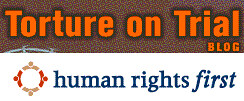Today, The Guardian's
Observer will
run a story giving details of horrific torture allegedly used by the new Iraqi government's forces. Tomorrow, the Iraqi government will respond to the allegations by admitting that the incidents occur, but denying that they are caused by any government policy.
The story refers first to the HRW report The New Iraq? Torture and ill-treatment of detainees in Iraqi custody (blog entry reference), in which it was reported that Iraqi police, jailers and intelligence agents, many of them holding the same jobs they had under Hussein, are "committing systematic torture and other abuses" of detainees. Several of the detainees claim that US Marines were present and observed their torture.
The Observer adds more serious allegations to those of HRW, giving an overview of widespread torture tactics, and detailing some individual cases. It links them to the Iraqi Ministry of the Interior, and the police commando units that operate from there. The abuses credited to them are summarised below.
The Observer includes the following general tactics:
- extra-judicial executions
- a 'ghost' network of detention facilities
- tortured and executed victims dumped in shallow graves
The Observer includes the following case studies, and notes that it includes "methods resurrected from the time of Saddam". I have provided a link for tactics reminiscent of those more recently employed by the Coalition of the Willing:
- Hassan an-Ni'ami. His capture by the Ministry of Interior's paramilitary police commandos "Rapid Intrusion" was reported on television. His corpse was found with the following:
- police-issue cuffs still attached to his wrist, with evidence that he was hung from them (c.f. Palestinian Hanging, Abu Ghraib , Shahid incident)
- burn marks on his chest, near his right nipple (c.f. Marine burns al-Mumudiyah, Asamiya Palace ).
- a series of horizontal welts wrapping around his torso, breaking the skin on his chest, consistent with beating with cable (c.f. incidents credited to the US military: Arar's beating, Lakoul's beating, and Mowhoush's beating. Also those credited to the Iraqi forces: Mahdi's beating, Shahid's beating, Ali's beating)
- a broken nose
- small wounds consistent with cigarette burns
- a broken arm
- one higher vertebrae pushed inwards
- a cluster of neat circular wounds on both sides of his left knee, suggesting that he had been knee-capped with an electric drill
- several bullets into his chest and head
- Corpses of farmers found in shallow graves showed the following evidences:
- bullet to the head suggesting execution
- face blackened by strangulation
- bruises to the forehead
- evidence of punch in the eye
- fractured ankle
- burn marks
- puncture wounds consistent with the use of a spiked "knuckle-duster"
- Tahar Mohammed Suleiman al-Mashhadani seized by Ministry of the Interior paramilitary police Rapid Intrusion (part of the "Wolf Brigade"). He was found by his family 20 days later, his corpse tortured almost beyond recognition.
- 'Zaid', who spoke to the reporters, alleges he was taken by the Ministry of the Interior, and there saw men who had been tortured.
- 'Abu Ali' claims that he was:
- beaten on the feet
- hung by his arms
- threatened with anal penetration by a bottle




